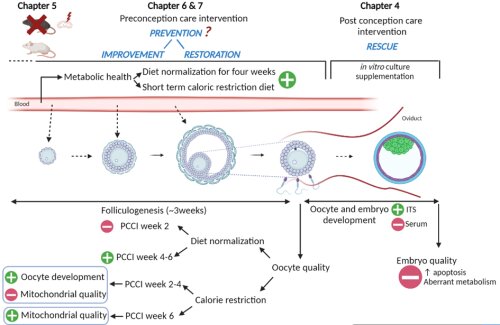Opportunities for improvement of oocyte quality in metabolically compromised conditions: from discoveries in the well until the development of preconception care strategies in an obese mouse model
Anouk Smits, MSc, PhD
Date: 31 March 2022 at 5pm
Location: Building O, Aula O.O7, Campus Drie Eiken, Universiteisplein 1, Wilrijk

Abstract
There is a significant negative impact of metabolic health disorders (like obesity) on female fertility, with an important role of reduced oocyte and embryo quality. As a result, more and more research focuses on the possibilities of specific interventions to improve fertility. Such intervention should prevent further damage or should improve and/or recover oocyte quality leading to an optimized oocyte developmental competence and ultimately restored fertility. Can we substantiate these concepts in vitro and which mouse model should be used to investigate the importance of preconception care in vivo?
The consequences of maternal metabolic disorders on oocyte quality are clear. However, it is not known if this metabolically-compromised oocyte can be rescued. An in vitro bovine exposure model was used to obtain metabolically-compromised oocytes. To investigate the impact of post-conception care interventions, the in vitro culture medium was supplemented with anti-apoptotic, antioxidative and mitogenic factors. Results indicated that supportive embryo culture conditions might improve oocyte developmental competence but resulting embryo quality was still aberrant.
Research investigating the impact of obesity on metabolic health (and fertility) often uses the inbred C57BL/6 strain. However, inbred strains are characterized by reduced fertility and might limit translation to human outbred physiology. We showed that control inbred C57BL/6 mice had oocytes with already high cellular stress and significant ultrastructural abnormalities. This deviating profile was only present in outbred Swiss mice after exposure to an obesogenic diet for 13 weeks. These results indicate that Swiss mice are the better choice for research regarding obesity and oocyte quality.
Nowadays, the development of preconception care interventions (PCCI) for obese women to improve their fertility is gaining more and more attention. However, so far there are no clear preconception guidelines. Knowledge on the impact of dietary PCCI on oocyte quality and the necessary duration for this PCCI is lacking. Therefore, the impact of diet normalization or caloric restriction for different time periods on metabolic health and oocyte quality of high fat or high-fat/high-sugar diet-induced obese mice was tested. The impact of the tested PCCI seemed to depend partially on the obesogenic diet used. Overall, the results indicated that switching to an ad libitum control diet for at least four weeks was the most promising approach to improve metabolic health and oocyte quality. However, complete recovery of oocyte quality was not present. These increased fundamental insights can bridge the gap towards clear preconception guidelines for obese women planning for pregnancy.
